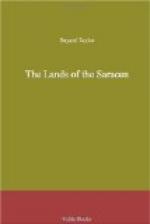A number of Arab cameleers, who had come with travellers across the Desert from Egypt, were encamped near us. Francois was suspicious of some of them, and therefore divided the night into three watches, which were kept by himself and our two men. Mustapha was the last, and kept not only himself, but myself, wide awake by his dolorous chants of love and religion. I fell sound asleep at dawn, but was roused before sunrise by Francois, who wished to start betimes, on account of the rugged road we had to travel. The morning was mild, clear, and balmy, and we were soon packed and in motion. Leaving the baggage to follow, we rode ahead over the fertile fields. The wheat and poppies were glistening with dew, birds sang among the fig-trees, a cool breeze came down from the hollows of the hills, and my blood leaped as nimbly and joyously as a young hart on the mountains of Bether.
Between Ramleh and the hill-country, a distance of about eight miles, is the rolling plain of Arimathea, and this, as well as the greater part of the plain of Sharon, is one of the richest districts in the world. The soil is a dark-brown loam, and, without manure, produces annually superb crops of wheat and barley. We rode for miles through a sea of wheat, waving far and wide over the swells of land. The tobacco in the fields about Ramleh was the most luxuriant I ever saw, and the olive and fig attain a size and lusty strength wholly unknown in Italy. Judea cursed of God! what a misconception, not only of God’s mercy and beneficence, but of the actual fact! Give Palestine into Christian hands, and it will again flow with milk and honey. Except some parts of Asia Minor, no portion of the Levant is capable of yielding such a harvest of grain, silk, wool, fruits, oil, and wine. The great disadvantage under which the country labors, is its frequent drouths, but were the soil more generally cultivated, and the old orchards replanted, these would neither be so frequent nor so severe.
We gradually ascended the hills, passing one or two villages, imbedded in groves of olives. In the little valleys, slanting down to the plains, the Arabs were still ploughing and sowing, singing the while an old love-song, with its chorus of “ya, ghazalee! ya, ghazalee!” (oh, gazelle! oh, gazelle!) The valley narrowed, the lowlands behind us spread out broader, and in half an hour more we were threading a narrow pass, between stony hills, overgrown with ilex, myrtle, and dwarf oak. The wild purple rose of Palestine blossomed on all sides, and a fragrant white honeysuckle in some places hung from the rocks. The path was terribly rough, and barely wide enough for two persons on horseback to pass each other. We met a few pilgrims returning from Jerusalem, and a straggling company of armed Turks, who had such a piratical air, that without the solemn asseveration of Francois that the road was quite safe, I should have felt uneasy about our baggage. Most of the persons we passed were Mussulmen, few of




